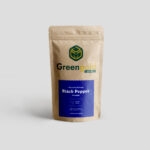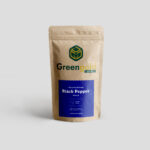Switching from conventional to organic cardamom farming is a rewarding but challenging journey. It requires patience, careful planning, and adherence to strict organic farming guidelines. However, the benefits—higher market prices, improved soil health, and eco-friendly farming—make it worth the effort!
Here’s a step-by-step guide to help you transition smoothly. 🚜✨
✅ 1. Understand Organic Farming Principles 📚
Before switching, farmers must learn organic farming techniques and understand what is allowed and prohibited in organic cultivation.
🔍 Key principles of organic farming:
✔️ No synthetic pesticides, herbicides, or chemical fertilizers
✔️ Use only organic compost, manure, and biofertilizers
✔️ Follow natural pest and disease management methods
✔️ Ensure soil health, biodiversity, and sustainability
💡 Tip: Attend organic farming workshops or consult local organic certification bodies to understand the requirements.
🛑 2. Stop Using Chemical Inputs 🚫
One of the biggest challenges in transitioning is eliminating chemical fertilizers and pesticides.
📌 What to avoid:
❌ Synthetic pesticides, fungicides & herbicides
❌ Chemical fertilizers like urea, DAP, and potash
❌ Growth boosters and synthetic hormones
✔️ Organic alternatives:
🌱 Compost, farmyard manure, and vermicompost for soil fertility
🐜 Neem oil, bio-pesticides, and natural predators for pest control
🍂 Mulching & cover crops to improve soil moisture and prevent weeds
💡 Tip: Slowly reduce chemical use while increasing organic inputs to help plants adjust.
🌾 3. Improve Soil Health Naturally
Healthy soil = stronger cardamom plants and better yields.
🌱 Ways to enhance soil fertility:
✔️ Apply compost & green manure to restore nutrients
✔️ Use biofertilizers like azotobacter & phosphate-solubilizing bacteria
✔️ Mulching with dried leaves & husks to retain moisture and suppress weeds
✔️ Crop rotation with nitrogen-fixing plants like legumes
💡 Tip: Regularly test your soil to monitor nutrient levels and make adjustments! 📊
🦠 4. Switch to Natural Pest & Disease Management 🐜
Without synthetic pesticides, organic pest control requires proactive methods.
🔬 Natural pest control techniques:
✔️ Neem oil & garlic extract sprays for insect protection
✔️ Trichoderma & Beauveria bassiana for fungal disease control
✔️ Companion planting (e.g., marigold, lemongrass) to repel pests
✔️ Pheromone & light traps to monitor and control insect populations
💡 Tip: Encourage beneficial insects like ladybugs and spiders to naturally keep pests in check! 🕷️
🚰 5. Adapt Organic Water Management Techniques 💧
Proper irrigation is crucial for healthy organic cardamom plants.
🌊 Water conservation methods:
✔️ Drip irrigation for efficient water usage
✔️ Rainwater harvesting to reduce dependency on groundwater
✔️ Mulching to retain soil moisture
✔️ Terrace farming & contour planting to prevent water runoff in hilly areas
💡 Tip: Avoid chlorinated water or chemically treated irrigation sources to maintain soil biodiversity.
📜 6. Start the Organic Certification Process
If you plan to sell certified organic cardamom, you need official certification.
🏆 Steps to get certified:
1️⃣ Register with a recognized organic certification body (e.g., NPOP India, USDA Organic, EU Organic)
2️⃣ Maintain detailed farm records of inputs, practices, and yields
3️⃣ Undergo soil & residue testing to ensure no chemical contamination
4️⃣ Complete the mandatory conversion period (typically 2-3 years)
💡 Fact: Many certification agencies offer financial assistance & training to help farmers transition!
🔄 7. Follow a Transition Period (2-3 Years) ⏳
Organic certification requires a conversion period to allow the land to recover from past chemical use.
🌱 During the transition:
✔️ Gradually increase organic inputs while reducing synthetic chemicals
✔️ Monitor soil health, pest control, and plant growth
✔️ Begin marketing your produce as “in conversion” organic
💡 Tip: Even before full certification, organic cardamom can fetch higher prices in specialty markets! 💰
🛒 8. Find Organic Buyers & Premium Markets
Once certified, connect with the right buyers to maximize profits.
🌍 Best markets for organic cardamom:
✔️ Specialty organic stores & gourmet markets
✔️ Export markets (USA, Europe, Middle East)
✔️ Online organic marketplaces & direct-to-consumer sales
✔️ Pharmaceutical & Ayurvedic industries for medicinal use
💡 Tip: Branding your product as chemical-free & sustainable helps attract premium customers! 🌱🏷️
🎯 Final Thoughts: Is It Worth Switching to Organic?
Yes! While the transition takes time, organic cardamom farming offers:
✅ Higher profits due to premium pricing 💰
✅ Healthier soil & environment 🌍
✅ Better long-term sustainability for farmers 🌱
✅ Safer, chemical-free cardamom for consumers 🍵
💡 Are you planning to switch to organic cardamom farming? Let’s discuss below! 👇💬
🛒 Looking for Certified Organic Cardamom?
Buy 100% organic, high-quality cardamom here:












